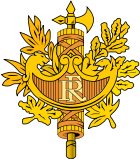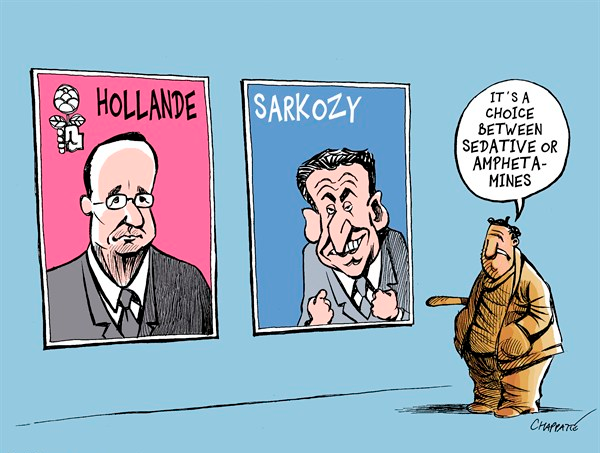Cross posted from The Stars Hollow Gazette
Up Date: Socialist Party candidate François Hollande garnered 28.4% of the vote beating Nicholas Sarkozy who came in second with 25.5%. The surprise was the third place showing by the far right National Front candidate Marine Le Pen with 20%. The second round will be om May 6 with the run off election between Sarkozy and Hollande. Hollande is favored in the polls but nothing is certain, especially with the far right’s strong showing. The pollsters were wrong about the strength of leftist candidate Jean-Luc Mélenchon and voter turn out which topped 80%; they could be very wrong about Sarkozy’s chances, too.
 The French go to the polls today in the first round of voting for president, with a second round run-off, if necessary, being held on 6 May. The incumbent president, Nicolas Sarkozy, is running for a second successive and, under the terms of the Constitution of France, final term in the election. Unlike the United States, the president of France is elected directly by the citizens and must receive a majority of the vote (50% +1). Elections are always held on Sunday and this is the only office that is being considered by the voters today. Other offices for the Parliament and local elections each have their own designated election days.
The French go to the polls today in the first round of voting for president, with a second round run-off, if necessary, being held on 6 May. The incumbent president, Nicolas Sarkozy, is running for a second successive and, under the terms of the Constitution of France, final term in the election. Unlike the United States, the president of France is elected directly by the citizens and must receive a majority of the vote (50% +1). Elections are always held on Sunday and this is the only office that is being considered by the voters today. Other offices for the Parliament and local elections each have their own designated election days.
The campaigns end at midnight the Friday before the election, then, on election Sunday, by law, no polls can be published, no electoral publication and broadcasts can be made. The voting stations open at 8 am and close at 6 pm in small towns or at 8 pm in cities, depending on prefectoral decisions. By law, publication of results or estimates is prohibited prior to that time; such results are however often available from the media of Belgium and Switzerland, or from foreign Internet sites, prior to that time. The first estimate of the results are thus known at Sunday, 8pm, Paris time; one consequence is that voters in e.g. French Guiana, Martinique and Guadeloupe knew the probable results of elections whereas they had not finished voting, which allegedly discouraged them from voting. For this reason, since the 2000s, elections in French possessions in the Americas, as well as embassies and consulates there, are held on Saturdays as a special exemption. (I voted Saturday at the French Consulate in NYC.)
France does not have a full-fledged two-party system, that is, a system where, though many political parties exist, only two parties have a chance of getting elected to major positions. One of the reasons that there are so many candidates is that it only takes 500 signatures of support from about 47,000 elected representatives throughout France to stand for president. Plus, as Sophie Meunier at Huffington Post explains “it’s cheap”:
By law, campaign expenses are subjected to a maximum ceiling, and spending in excess of that is illegal. The state also subsidizes candidates. It gives about eight million euros, half of the maximum amount of expenses allowed in the first round, to those who obtain more than 5% of the votes in the first round and about 800,000 euros to those who do not make the 5% cut. In 2007, Sarkozy spent 21 million euros to win the presidential contest, while his main opponent, the socialist Ségolène Royal, spent 20 million euros. French politicians are, therefore, not enslaved to special interests or Super-PACs as they are in the U.S.
Televised political ads are banned — only a small number of “statements” by each candidate, following strict rules on time and editing, can be broadcast on television and only during the five-week period of the “official” campaign as defined by law.
France enforces its mantra of “equality” all the way to the finish line of the presidential campaign. For five weeks before the second round of the election, the law mandates that all candidates are given (truly) equal time on television and radio. If an anchor, whether on a public or private channel, interviews Sarkozy or Hollande on prime time, for example, she has to interview the New Anti-Capitalist Party candidate Philippe Poutou and the “Debout la République” candidate Nicolas Dupont-Aignan (both currently polling at 1 percent) on prime time for the same length of time over the next few days. Airwave time and exposure is monitored and enforced by the state’s Conseil Supérieur de l’Audiovisuel (High Council for Audiovisual).
The positive consequence of these rules is that a candidate can spend almost no money and still be granted equal access and time on all the major television and radio outlets. This enables the emergence of small candidates and can rejuvenate democracy
In the first round, as today’s election, M. Sarkozy has several challengers from different political parties. His primary challenger is François Hollande, the candidate of the Socialist Party, who has topped the opinion polls throughout the campaign. Besides M. Sarkozy and M. Holland, there are 8 other candidates and if no candidate wins 50% of the votes, there will be a second run-off round. the other candidates are:
The Greens: Member of the European Parliament (MEP) and former magistrate, Eva Joly;
National Front: Party President and MEP Marine Le Pen;
Left Front: Mep Jean-Luc Mélenchon;
New Anticapitalist Party: Philippe Poutou;
Workers’ Struggle: Nathalie Arthaud;
Solidarité et progrès: Jacques Cheminade;
Democratic Movement: Member of Parliament (MP) François Bayrou;
and Mayor and MP Nicolas Dupont-Aignan.
M. Holland is expected to win even if a run off is necessary, since M. Sarkozy’s political policies and style are widely unpopular with the French. Both have promised to balance the budget, although Hollande has favored growth over the sort of austerity measures that Sarkozy has promoted for the eurozone along with German chancellor Angela Merkel. The policy alignment of the two European leaders have led some critics to coin the term, “Merkozy” and publicly wonder if “Merkozy” was running for president. Chancellor Merkel’s unprecedented vocal support of M. Sarkozy, has added to his fall in popularity.
An article by the BBC News, gives an analysis of why he is blatantly disliked that has played a major part in this election. At AMERICAblog, Deputy Editor Chris Ryan, gives his take on Sarkozy’s unpopularity:
My own two cents is that France is a fairly conservative (with a small “c”) country and he thrives on being flashy, which people strongly dislike. His behavior was perhaps acceptable in his suburban neighborhood of Neuilly-sur-Seine where flashiness is more of the norm. [..]
What was previously viewed (by some) as action was eventually regarded (by many more) as little more than hyperactivity without direction. There was always talk of change but in the end, there wasn’t a great deal of actual change. One could also argue that France, like many countries, never really wanted change in the first place.What was previously viewed (by some) as action was eventually regarded (by many more) as little more than hyperactivity without direction. There was always talk of change but in the end, there wasn’t a great deal of actual change. One could also argue that France, like many countries, never really wanted change in the first place.
There has also been a close watch on third place with the rise of far-left firebrand Jean-Luc Melenchon, who has polled between 12 to 15% of the vote, competing with the far-right’s Le Pen for that spot. Melenchon has built an alliance of Communists, Trotskyites and anti-capitalists, drawing huge crowds at his rallies. Experts feel if Melenchon wins third place in Sunday’s vote, it would encourage Hollande to veer further to the left ahead of the May 6 knock-out round.
Under current rules, French media are barred from publishing the surveys or even partial results until 8 PM Paris time, 2 PM EDT. Results will be posted here as they come available.

 The French Presidential election will take place this Sunday, May 6. Meanwhile, the campaigning has ended Friday evening with the Socialist challenger,
The French Presidential election will take place this Sunday, May 6. Meanwhile, the campaigning has ended Friday evening with the Socialist challenger,  The French go to the polls today in the first round of voting for president, with a second round run-off, if necessary, being held on 6 May. The incumbent president,
The French go to the polls today in the first round of voting for president, with a second round run-off, if necessary, being held on 6 May. The incumbent president,